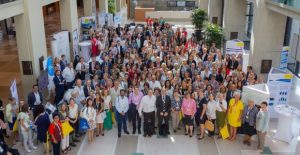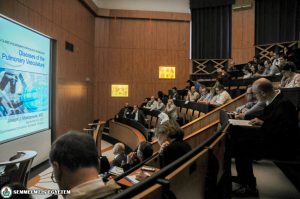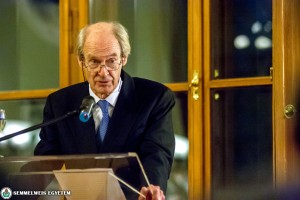The international workshop related to the most current questions of HAE (hereditary angioedema) called C1-Inhibitor Deficiency Workshop was organized for the 10th time this year. The main organizers of the event were Dr. Henriette Farkas, Professor of the 3rd Department of Internal Medicine and Dr. Lilian Varga, Senior Research Fellow. The opening speech of the workshop was held by Dr. László Hunyady, Dean of the Faculty of Medicine. Altogether 350 participants arrived at the event from 42 countries.
During his opening speech Dr. László Hunyady, Dean expressed his appreciation to Dr. Henriette Farkas and to Dr. Lilian Varga for organizing this conference, which has now become one of the most determining international events in this field. Dean Hunyady emphasized the importance of this event, since the organizers have managed to establish such a community of professionals within this particular area, who greatly contribute to international research and to the development of health care.
 “The focus of the lectures was primarily the discovery of the genetic background of HAE (hereditary angioedema), the emergence of the disease, its pathomechanism, the development of the patients’ quality of life and new treatment opportunities. One of the specialties of the 4-day workshop organized every other year is that the participants arrive from a wide variety of areas: there are researchers, clinicians, laboratory professionals as well as representatives of patients’ associations and CRO companies dealing with drug development. Recently this range has been supplemented by the participation of health professionals. Since HAE patients often give the injections to themselves in case of an edematous attack, nurses especially have a very important role in teaching this process to them properly.” said Dr. Henriette Farkas, Professor at the 3rd Department of Internal Medicine, Head of the National Angioedema Centre operating at the 3rd Department of Internal Medicine at Semmelweis University.
“The focus of the lectures was primarily the discovery of the genetic background of HAE (hereditary angioedema), the emergence of the disease, its pathomechanism, the development of the patients’ quality of life and new treatment opportunities. One of the specialties of the 4-day workshop organized every other year is that the participants arrive from a wide variety of areas: there are researchers, clinicians, laboratory professionals as well as representatives of patients’ associations and CRO companies dealing with drug development. Recently this range has been supplemented by the participation of health professionals. Since HAE patients often give the injections to themselves in case of an edematous attack, nurses especially have a very important role in teaching this process to them properly.” said Dr. Henriette Farkas, Professor at the 3rd Department of Internal Medicine, Head of the National Angioedema Centre operating at the 3rd Department of Internal Medicine at Semmelweis University.
This year the HAE Patients’ Award Prize was awarded to Dr. Bruce Zuraw, Head of the American Hereditary Angioedema Center. Several leading professors and the most recognized international representatives of this field were invited to the conference: Dr. Alvin Schmaier from the USA, Dr. Marco Cicardi from Italy. The following lecturers held presentations during the conference: Dr. Avner Reshef from Israel, Dr. Dumitru Moldovan from Romania and Dr. Attila Mócsai, Professor at the Department of Physiology of Semmelweis University.
 C1-inhibitor is a regulatory protein that is missing from the blood of HAE patients. This lack of protein leads to the release of bradykinin, as a result of which an edema arises. The edematous attack can appear on the face, on the arms and legs, in the gastro-intestinal tract or in the larynx. If an edema appears in the larynx, the patient might get asphyxiated because of an obstruction of the respiratory tracts in case the appropriate, special treatment is not provided in time. HAE is a hereditary and rare disease, its range of appearance is 1:10 000 – 1:50 000, which means that in Hungary 200-1000 patients can be concerned. The first conference was organized in 1999 by Dr. Henriette Farkas and Dr. Lilian Varga as the international forum of HAE. At that time the number of participants was 40, but since then this number has multiplied: this year 350 people registered. The range of topics was also extended: besides the hereditary forms of edema, the lectures held during the workshop also dealt with the altogether nine types of edema mediated by bradykinin.
C1-inhibitor is a regulatory protein that is missing from the blood of HAE patients. This lack of protein leads to the release of bradykinin, as a result of which an edema arises. The edematous attack can appear on the face, on the arms and legs, in the gastro-intestinal tract or in the larynx. If an edema appears in the larynx, the patient might get asphyxiated because of an obstruction of the respiratory tracts in case the appropriate, special treatment is not provided in time. HAE is a hereditary and rare disease, its range of appearance is 1:10 000 – 1:50 000, which means that in Hungary 200-1000 patients can be concerned. The first conference was organized in 1999 by Dr. Henriette Farkas and Dr. Lilian Varga as the international forum of HAE. At that time the number of participants was 40, but since then this number has multiplied: this year 350 people registered. The range of topics was also extended: besides the hereditary forms of edema, the lectures held during the workshop also dealt with the altogether nine types of edema mediated by bradykinin.
 87 abstracts were received, 7 oral and 2 poster sections were held and all the abstracts will be published in the journal entitled Allergy, Asthma and Clinical Immunology. Out of the four best young researchers award two were awarded to the members of the research team of the 3rd Department of Internal Medicine: Márta Debreczeni, PhD student and Anna Koncz, a student of the Students’ Scientific Association.
87 abstracts were received, 7 oral and 2 poster sections were held and all the abstracts will be published in the journal entitled Allergy, Asthma and Clinical Immunology. Out of the four best young researchers award two were awarded to the members of the research team of the 3rd Department of Internal Medicine: Márta Debreczeni, PhD student and Anna Koncz, a student of the Students’ Scientific Association.
Besides the main organizers the following people played an active role in the organization: Dr. György Harmat, Professor, Nóra Veszeli and Dr. Kinga Viktória Kőhalmi, PhD students.
Pálma Dobozi
Photos: Tamás Thaler
Translation: Katalin Romhányi


